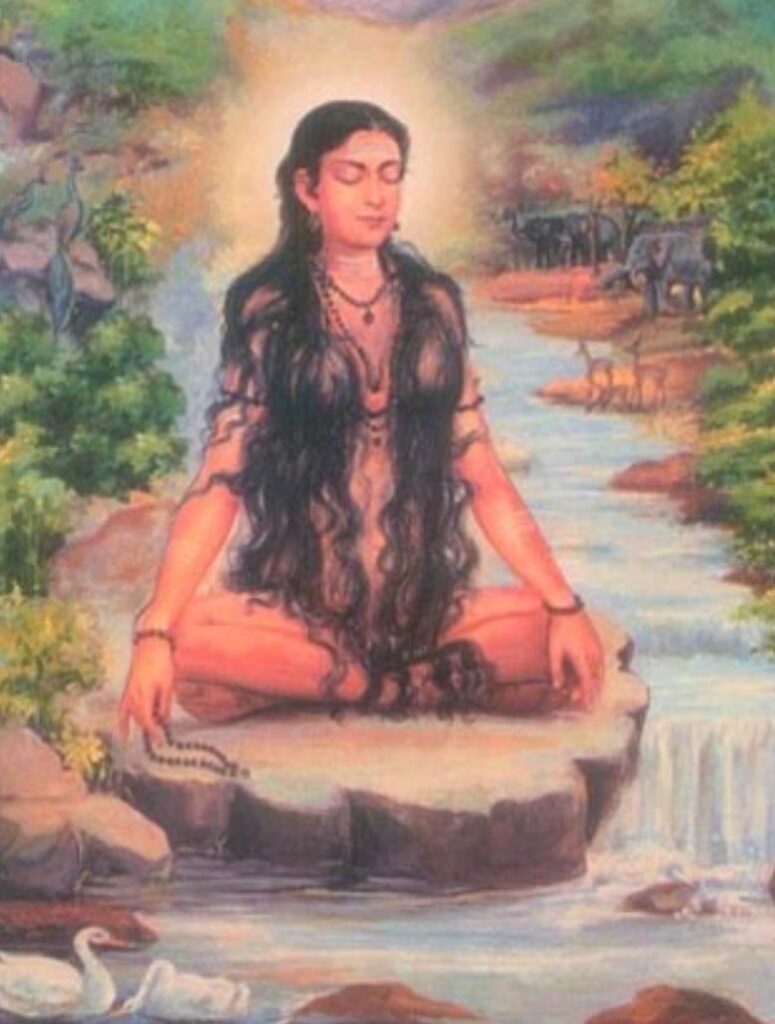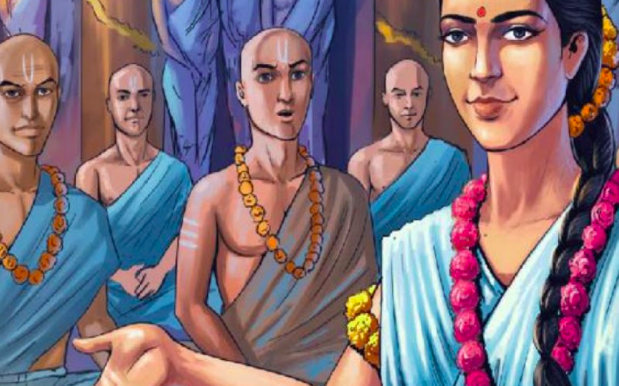The great Indian sage Gargi Vachaknavi was one of the earliest symbols of feminism in the world. Born in the 9th to 7th century BCE, in Northern India, near Mithila, she was a natural-born philosopher. She was a renowned exponent of Vedic literature.

Early Life:
Born as the daughter of sage Vachaknu, she was also the descendant of the great sage Garga. She was named after these two illustrious personalities as Gargi Vachaknavi. From a young age, she was interested in Vedic literature and Vedic philosophy.
Her mother was against this idea. She had seen firsthand how a sage got immersed in the religious texts and forgot about practical living as a householder. She wanted young Gargi to marry and become a grahini.
Rishi Gargi’s knowledge and intelligence:
But the strong-headed Gargi had more intellectual and spiritual goals in her mind. She was greatly interested in learning the Vedas and Puranas. She was endowed with great intelligence and became proficient in the complex philosophies of all four Vedas.
Even men who strived to be her equal in intellect could not surpass her knowledge in this field. Rishi Gargi as she is known is even mentioned in the Rigveda; in its Griha Sutra. Through her deep meditation, she revealed some of the mantras in the Rigveda. Her views on philosophy are considered so exalted that they find mention in the Chandyog Upanishads.
Recognition as Nav Ratna (Nine Jewels):
She was greatly honored and respected for her mastery of the science and the philosophies of the Vedas. She participated and gave lectures in Brahma Yagyas and was bestowed with the title of Brahma Vadini. It was a testimony to her greatness that she was recognized as one of the Navaratnas( Nine Jewels ) in the court of King Janak of Mithila.
Gargi and Yajnavalkya debate:
Brihadaranyaka Upanishad mentions that once King Janaka of Vaidehi decided to hold a Rajsuya Yagna. In this Yagna, he invited all the wise and learned kings, princes, and sages to participate in religious debates. A large number of respected sages participated.
An aroma of spirituality permeated the atmosphere with the burning of vast quantities of sandalwood, ghee, and barley. The stage was set for spiritual debates of exalted quality. The King decided to hold a debate competition to select the sage who was most knowledgeable about the Brahman. The grand prize was 1000 cows, with their horns dangling with 10 gms of gold each.
Amongst the august gathering was Sage Yajnavalkya, who was considered as the most knowledgeable of them all. This was because he had mastered the art of Kundalini Yoga. In fact the sage himself was so confident of winning the debate, that he ordered his assistant and disciple Samsrava to drive the gold laden cow herd to his ashram as he was sure to win.
This enraged the other notable scholars present as they felt he was grabbing the prize unfairly. However some less confident sages lost their confidence and did not take part in the debate. Only 8 renowned sages challenged Yajnavyalka to a wordy duel and amongst them was Rishi Gargi. One by one the great sages challenged Yajnavyalka and posed difficult questions about the Brahman to him, only to concede defeat in the end.

Finally it was Gargi’s turn. She first questioned his claim of superiority. Then she started questioning him on the metaphysical states of being and on the immortality of the soul. As Yajnavyalka answered all her questions with ease, she started quizzing him on more practical aspects; like the environment of the word and the origins of the very existence.
The debate was carried out in this manner:
Q. Since the whole world is woven back and forth on water, then on what is it woven back and forth?
A. On air Gargi.
Q. On what then is air woven back and forth?
A. On the intermediate regions Gargi.
Q. On what then are the worlds of the intermediate regions woven back and forth?
A. On the worlds of the Gandharvas Gargi.
The debate carried on for a long time as Gargi asked Yajnavyalka about the Universe, the sunset, the moon and stars and the gods Indra and Prajapati. Finally Gargi requested the great sage to answer a few more questions to which Yajnavyalka obliged. She then questioned him on the weave of reality.
Q. That which is above the sky, that which is below the EarthEarth. That which is between these two, the sky and the earth. That; which people call the past, present and the future; across what that is woven, warp and woof?
A. Space Gargi.
Q. What then is space woven on, warp and woof?
A. O Gargi if one performs sacrifices and worship and austerity for many thousands of years and has no knowledge of the Imperishable; then his work is limited. Across this imperishable unseen is space woven, warp and woof.
Now Gargi had one final question left to ask:
Q. On what, is Brahman, the world of the imperishable woven?
A. O Gargi do not proceed further as you will lose your mental balance.
Gargi gracefully conceded defeat to the superior knowledge of Yajnavyalka. She addressed the gathering to consider themselves honored to bow before the great sage and declared that nobody had greater knowledge about the Brahman than him.
Oldest icon of feminism:
Rishi Gargi was the oldest icon of feminism found in the ancient Hindu texts. She has been extensively quoted in the Vedas and Upanishads. It is a reflection of the glorious and progressive Old Vedic Age, where women could uplift themselves and achieve great heights.
Interested in becoming a yoga teacher?
Newsletter
Upcoming events and latest blogs